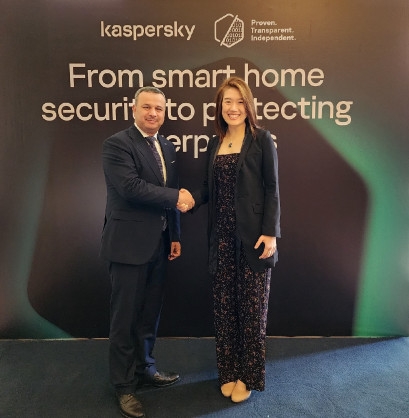As part of the Africa Cyber Defense Forum (ACDF), Kaspersky (www.Kaspersky.co.za) has today announced the opening of its first Transparency Center in the African region. The new center, located in Kigali, Rwanda, is opening as part of Kaspersky’s Global Transparency Initiative, established to highlight the reliability of the company’s solutions and advocate for greater transparency throughout the cybersecurity industry. The new center offers its visitors a comprehensive overview of Kaspersky’s engineering and data processing practices, and a live demonstration of the source code for its products and services.
Internet penetration in the African region has been steadily increasing over the years: according to the World Bank (https://apo-opa.co/3QYBJuX), broadband Internet access in Africa grew from 26% in 2019 to 36% in 2022. As outlined in the African Union’s Digital Transformation Strategy (https://apo-opa.co/3ucquWR), all people in Africa should be digitally empowered by 2030, which means that digitalisation will be enhancing, bringing both opportunities and challenges.
The new Transparency Center in Kigali is available for Kaspersky’s partners, customers, and regulators responsible for cybersecurity. It is designed to serve the “blue piste” review option, which has gained significant popularity among Transparency Centers’ visitors since the opening of the first facility in 2018. It offers a general overview of Kaspersky’s engineering and data processing practices: throughout their visit, partners and customers are welcome to ask Kaspersky experts any questions related to the company’s data processing procedures and the functioning of its solutions. Additionally, as part of the “blue piste,” they can improve or acquire skills to assess the security of ICT products that their organisations use, learning the highlights of Kaspersky’s Cyber Capacity Building Program (https://apo-opa.co/3SKSOd5) for government organisations, academia and companies.
Underscoring the strong nexus between transparency and the fight against cybercrime, and Kaspersky’s commitment to both causes, the new Transparency Center opening was welcomed by the African Union Mechanism for Police Cooperation (AFRIPOL):
“The African region is currently undergoing rapid digital transformation, with Internet penetration continually growing year on year. To counter potential security risks stemming from the use of technology, it is imperative to understand what forms an effective framework to mitigate risks. Today, as Kaspersky announces the opening of its first Transparency Center in the African region, we appreciate the company’s openness and welcome its Global Transparency Initiative, which is exemplary for organisations in the region in terms of building digital trust. Kaspersky has a proven track record of collaborating with local, regional and international law enforcement agencies to combat cybercrime, sharing its technical expertise, in the spirit of transparency,” AFRIPOL’s Acting Executive Director, Ambassador Jalel Chelba, commented.
With the opening of the facility in the region, Kaspersky will expand its network to encompass a total of 11 Transparency Centers located across Europe, Asia-Pacific, North and Latin America, the Middle East and Africa.
Introducing another milestone in the Global Transparency Initiative, Genie Sugene Gan, Head of Government Affairs and Public Policy for Asia-Pacific, Japan, Middle East, Turkey and Africa regions at Kaspersky, during her keynote speech at the ACDF, noted:
“A growing emphasis on cybersecurity within the pan-regional African agenda is piquing the interest of national authorities. However, there remains a significant gap in cyber-capacity building. By opening the Transparency Center, Kaspersky aims to address the local market needs, offering education in such critical areas as evaluating product security and establishing secure development processes. The Transparency Center opening marks a pivotal advancement and a significant milestone for both our organisation and the region, as we bring essential capacity-building capabilities and best cybersecurity practices to the region.”
Being a dedicated advocate for enhancing transparency in the cybersecurity industry, Kaspersky launched its Global Transparency Initiative in 2017, becoming a pioneer in advancing digital trust. The initiative reaffirms the company’s readiness to disclose how Kaspersky works, what standards it implements, how its solutions perform and why they are trustworthy. Kaspersky actively involves the broader community in validating and verifying the reliability of its products, internal processes, and overall business operations. As a significant aspect of the Global Transparency Initiative, the company leads as the first cybersecurity vendor to disclose its source code for external review.
To learn more on the Global Transparency Initiative or request a visit to a Transparency Center, please check the website (https://apo-opa.co/3MIAoG8).
Distributed by APO Group on behalf of Kaspersky.
About Kaspersky:
Kaspersky is a global cybersecurity and digital privacy company founded in 1997. Kaspersky’s deep threat intelligence and security expertise is constantly transforming into innovative solutions and services to protect businesses, critical infrastructure, governments and consumers around the globe. The company’s comprehensive security portfolio includes leading endpoint protection, specialized security products and services, as well as Cyber Immune solutions to fight sophisticated and evolving digital threats. Over 400 million users are protected by Kaspersky technologies and we help over 220,000 corporate clients protect what matters most to them. Learn more at www.Kaspersky.co.za.
About AFRIPOL:
AFRIPOL is a technical institution of the African Union (AU) with a mandate to strengthen cooperation between Police Agencies of AU member states in the prevention and fight against organized transnational crime, terrorism, and cybercrime. AFRIPOL HQ is located in Algiers, Algeria. The priority of AFRIPOL is to strengthen and harmonize the capacities of law enforcement agencies of the Fifty Five (55) AU member states and facilitate cooperation and collaboration among them and with similar mandate of other International Organizations in the prevention and fight against organized transnational crime.
